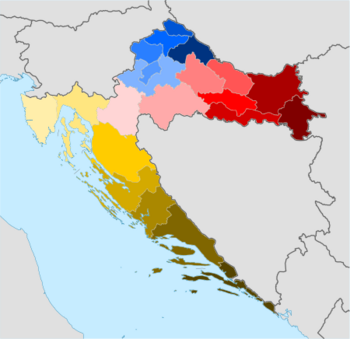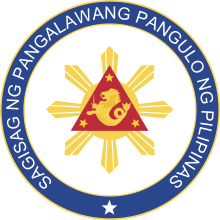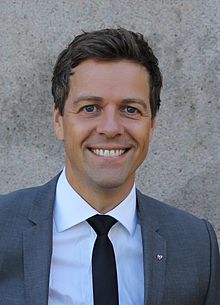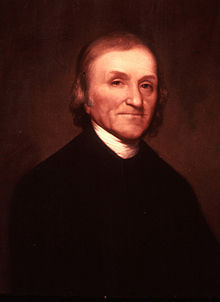Portal:Politics
| Main | Topics and categories | Tasks and projects |
The Politics portal
Politics (from Ancient Greek πολιτικά (politiká) 'affairs of the cities') is the set of activities that are associated with making decisions in groups, or other forms of power relations among individuals, such as the distribution of resources or status. The branch of social science that studies politics and government is referred to as political science.
It may be used positively in the context of a "political solution" which is compromising and non-violent, or descriptively as "the art or science of government", but also often carries a negative connotation. The concept has been defined in various ways, and different approaches have fundamentally differing views on whether it should be used extensively or in a limited way, empirically or normatively, and on whether conflict or co-operation is more essential to it.
A variety of methods are deployed in politics, which include promoting one's own political views among people, negotiation with other political subjects, making laws, and exercising internal and external force, including warfare against adversaries. Politics is exercised on a wide range of social levels, from clans and tribes of traditional societies, through modern local governments, companies and institutions up to sovereign states, to the international level.
In modern nation states, people often form political parties to represent their ideas. Members of a party often agree to take the same position on many issues and agree to support the same changes to law and the same leaders. An election is usually a competition between different parties.
A political system is a framework which defines acceptable political methods within a society. The history of political thought can be traced back to early antiquity, with seminal works such as Plato's Republic, Aristotle's Politics, Confucius's political manuscripts and Chanakya's Arthashastra. (Full article...)
Selected article
The Viet Nam Quoc Dan Dang is a revolutionary socialist political party that sought independence from French colonial rule in Vietnam during the early 20th century. Its origins lie in the mid-1920s, when a group of young Hanoi-based intellectuals began publishing revolutionary material. From 1928, the VNQDD attracted attention through its assassinations of French officials and Vietnamese collaborators. Under increasing French pressure, the VNQDD leadership switched tack, replacing a strategy of isolated clandestine attacks against individuals with a plan to expel the French in a single blow with a large-scale popular uprising. After stockpiling home-made weapons, the VNQDD launched an uprising on 10 February 1930 at Yen Bai with the aim of sparking a widespread revolt. The mutiny was quickly put down, with heavy French retribution. Nguyen Thai Hoc and other leading figures were captured and executed and the VNQDD never regained its political strength in the country. During the 1930s, the party was eclipsed by Ho Chi Minh's Indochinese Communist Party (ICP). Vietnam was occupied by Japan during World War II and, in the chaos that followed the Japanese surrender in 1945, the VNQDD and the ICP briefly joined forces in the fight for Vietnamese independence. However, after a falling out, Ho purged the VNQDD, leaving his communist-dominated Vietminh unchallenged as the foremost anti-colonial militant organisation.
Featured picture

A campaign poster from the National Union Party during the US election of 1864, showing presidential candidate Abraham Lincoln (left) and his running-mate Andrew Johnson. The Republican Party changed its name and selected Johnson, a former Democrat, to draw support from War Democrats during the Civil War.
Of the eight governors of the state, two have been elected to three terms, four have been elected to two terms, and one has been elected to one term. No state governor has yet resigned or died in office, nor did any territorial governor die in office. George Ariyoshi was the first Asian American to be governor of any U.S. state. The current governor is Democrat Josh Green, who took office on December 5, 2022. (Full article...)

Jesus College is one of the constituent colleges of the University of Oxford in England. The college was founded in 1571 by Queen Elizabeth I at the request of Hugh Price, a Welsh clergyman, who was Treasurer of St David's Cathedral in Pembrokeshire. The college still has strong links with Wales, and about 15% of students are Welsh. There are 340 undergraduates and 190 students carrying out postgraduate studies. Women have been admitted since 1974, when the college was one of the first five men's colleges to become co-educational. Old members of Jesus College are sometimes known as "Jesubites".
Harold Wilson studied at Jesus College from 1934 to 1937, and was later the Prime Minister of the United Kingdom during two periods (from October 1964 to June 1970, and from March 1974 to April 1976). More than 30 other Members of Parliament (MPs) have been educated at the college, from Sir John Salusbury who was elected as MP for Denbighshire in 1601 to Theresa Villiers who was elected as MP for Chipping Barnet in 2005. Sir Leoline Jenkins, who became a Fellow and later the Principal of the college, was Secretary of State for the Northern Department from 1680 to 1681 and Secretary of State for the Southern Department from 1681 to 1685. Sir William Williams served as Speaker of the House of Commons from 1680 to 1685 and as Solicitor General for England and Wales from 1687 to 1689. Evan Cotton was MP for Finsbury East before holding the position of President of the Bengal Legislative Council from 1922 to 1925. Several Welsh politicians have been educated at the college, some representing constituencies in Wales (such as Sir John Wogan, representing Pembrokeshire at various times between 1614 and 1644) and others working outside Parliament, such as D. J. Williams, a co-founder of the Welsh nationalist party Plaid Cymru. (Full article...)

The counties of Croatia (Croatian: hrvatske županije) are the first-level administrative subdivisions of the Republic of Croatia. Since they were re-established in 1992, Croatia has been divided into 20 counties and the capital city of Zagreb, which has the authority and legal status of both a county and a city (separate from the surrounding Zagreb County). As of 2015, the counties are subdivided into 128 cities and 428 (mostly rural) municipalities. The divisions have changed over time since the medieval Croatian state. They reflected territorial losses and expansions; changes in the political status of Dalmatia, Dubrovnik and Istria; and political circumstances, including the personal union and subsequent development of relations between the Kingdom of Croatia-Slavonia and the Kingdom of Hungary. (Full article...)

The vice president of the Philippines is the second-highest executive official in the government of the Philippines. The vice president is directly elected by qualified voters to a six-year term, and may be a cabinet member without confirmation from the Commission on Appointments and is first in the presidential line of succession.[1] There have been 15 vice presidents.[2] (Full article...)
The attorney general of West Virginia is the chief legal advisor to the West Virginia state government and is the state's chief law enforcement officer. The office was created by Article VII, Section 1 of the first Constitution of West Virginia in 1863. Under the current state constitution (1872), the attorney general is an executive department-level state constitutional officer, along with the governor, secretary of state, auditor, treasurer, and commissioner of agriculture. The attorney general is the ex officio reporter of the Supreme Court of Appeals of West Virginia. The constitution further specifies that the attorney general shall reside in the seat of state government, Charleston, during their term of office. In Charleston, they are to maintain public records, books, and papers pertaining to their office, and perform all duties prescribed by state law. the attorney general receives a salary of $95,000 per year.
The attorney general gives their written opinions and advice upon questions of law to state officials, heads of state institutions, and prosecuting attorneys. They are also responsible for all litigation on behalf of the state government and state agencies and departments. The attorney general represents the state in all claims processed by the United States Court of Claims, prosecutes civil actions as prescribed by law, enforces the state consumer, antitrust, and preneed burial statutes, and enforces the West Virginia Human Rights Act and the West Virginia Fair Housing Act. The attorney general is also an ex officio member of the Board of Public Works, Council of Finance and Administration, Public Land Corporation, West Virginia Housing Fund, West Virginia Sheriff’s Bureau, Department of Public Safety Retirement Board, Bid Suspension Review Board, State Building Commission, Commission on Charitable Contributions, Women’s Commission, Multistate Tax Compact Advisory Committee, Records Management, and Preservation Advisory Committee. (Full article...)
Selected quote
Selected biography

Knut Arild Hareide (born 23 November 1972) is a Norwegian politician who served as a member of parliament from Hordaland and as the leader of the Christian Democratic Party from 2011 to 2019. He served as Minister of Transport and Communications from 2020 to 2021, and as Minister of the Environment from 2004 to 2005 in the second Bondevik cabinet. In 2007, he announced he would step down from the national political scene for the time being, but he returned when he was nominated as the top candidate for the Christian Democratic Party ticket in Akershus in the 2009 election where he won the county's leveling seat. After Dagfinn Høybråten stepped down as party leader, Hareide was unanimously elected to take his place at the 2011 party convention. In the 2013 election, Hareide was reelected to parliament, this time from his home county of Hordaland.
Did you know (auto-generated) -

- ... that a priest refused to perform the wedding ceremony for Austrian socialist Josef Peskoller and his fiancée Maria Griel on political grounds in 1928?
- ... that Presidential Ballots, 1836–1892 was reviewed by Richard P. McCormick, who wrote that it "should stimulate a host of studies in the little-explored field of American political behavior"?
- ... that Dave Barrow quit municipal politics to work at his family's insurance brokerage before becoming mayor of Richmond Hill?
- ... that the photograph Kandake of the Sudanese Revolution symbolised the determination of the Sudanese people as they called for political change?
- ... that before entering politics, Romina Pérez worked at the Center for Legal Studies and Social Research, which "became a 'nursery' for intellectual and political cadres of the Movement for Socialism"?
- ... that Peter Merseburger refused to host a 1974 edition of German political TV magazine Panorama after a report by Alice Schwarzer on an abortion was cancelled by authorities?
More did you know...
- ...that the first phase of Mitt Romney's 2012 U.S. presidential campaign was announced via a video message?
- ...that Nazi scientists claimed to have trained a dog to call "Adolf Hitler" as "Mein Führer"?
- ...that for many years, the Russian Soviet Republic did not have its Communist Party?
- ...that the World War II idea of Polish-Czechoslovakian confederation was eventually discarded by the Czechs, whose leader chose instead to believe in the Soviet Union promises of alliance?
- ...that although U.S. President Barack Obama is Christian, high-ranked al-Qaida member Ayman al-Zawahiri has falsely claimed that Obama secretly "pray[s] the prayers of the Jews"?
- ...that Roman embassies to China are reported in Chinese historical accounts from as early as 166?
In this month
- June 28, 2004 - Canadian federal elections occur; the Liberal party loses its absolute majority.
News and Current events
- August 11: 4 local government areas in New South Wales, Australia locked down after COVID-19 case
- August 11: Australia: AstraZeneca vaccine access expanded by Victorian government
- August 1: Australia: Victorian lockdown lifted
- July 29: Tunisia's president dismisses prime minister, suspends parliament
- July 25: Australia: Wikinews interviews Reg Kidd, mayor of the City of Orange, about COVID-19 lockdown and local government
- July 23: South Australia enters week-long lockdown to contain COVID-19 Delta variant spread
- July 21: Technological University Dublin senior lecturer Dr Lorcan Sirr speaks to Wikinews on housing market in Ireland
- July 21: Three rural councils in New South Wales, Australia enter 7-day lockdown
- July 21: Australia: Victoria lockdown extended by a week with 85 active cases recorded
- July 15: California governor signs new state budget, eligible Californians to get stimulus payments
Topics and categories
General images
Related portals
Associated Wikimedia
The following Wikimedia Foundation sister projects provide more on this subject:
-
Commons
Free media repository -
Wikibooks
Free textbooks and manuals -
Wikidata
Free knowledge base -
Wikinews
Free-content news -
Wikiquote
Collection of quotations -
Wikisource
Free-content library -
Wikiversity
Free learning tools -
Wiktionary
Dictionary and thesaurus






















































